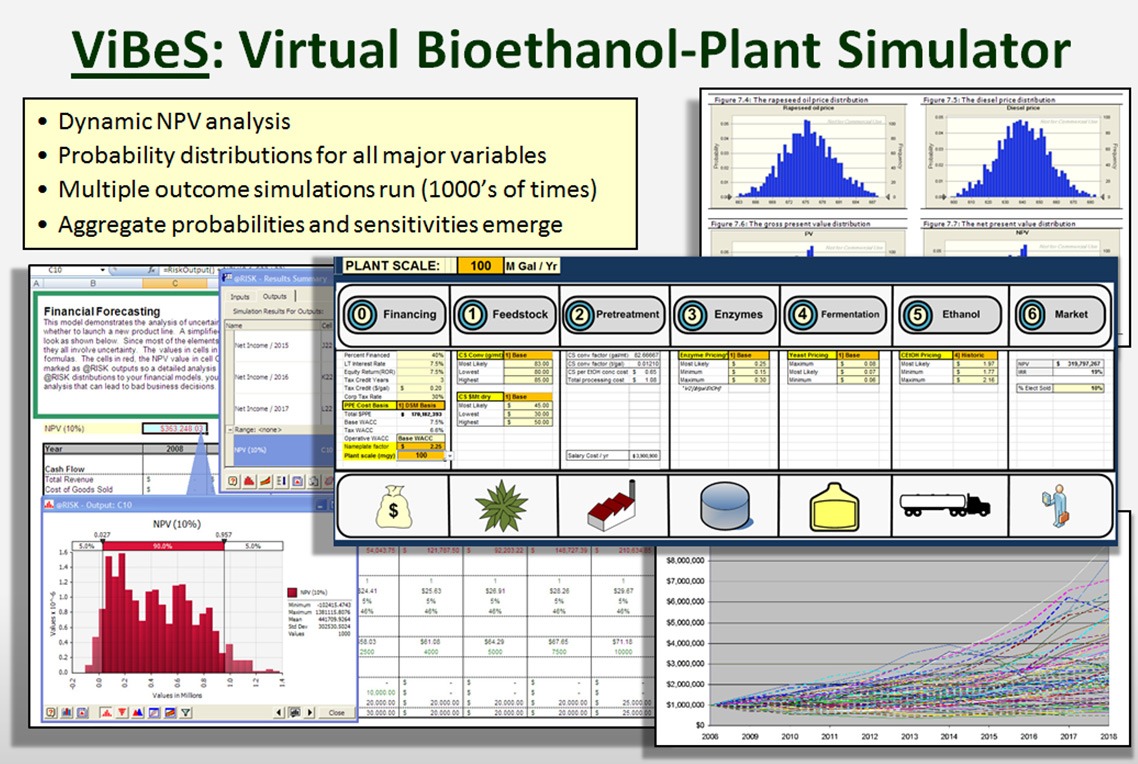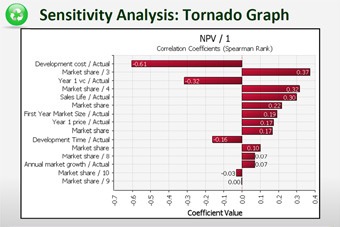
Background
Sark7 is an international consultancy that specialises in integrated analysis for sustainable energy projects. The aim is to bridge the gap between populist enthusiasm surrounding ‘green’ initiatives and the intensive financial risk analysis demanded by capital investors and participants.
A key aspect of Sark7’s value proposition is the in-depth decision-making insight provided by intensive, integrated computer-based modelling and simulation. Scott Mongeau, founder and consultant at Sark7, had previously used Palisade’s risk analysis software for market risk and investment analysis in a corporate treasury environment. As a result he believed the DecisionTools Suite was the ideal vehicle to objectively assess the profit potential of sustainability initiatives, separating ‘over-optimistic hype’ from realistic profit margins.
Finite Resources and Risky Alternatives
The petroleum industry is sustainable energy’s main competitor (as well as partner on occasion). Its established and streamlined supply chains and embedded position in the global economy give it distinct advantages. However, finite oil reserves are resulting in increasingly risky and cost-intensive exploration activity to locate and exploit new supplies (such as Athabasca Oil Sands, deep sea drilling and project development in politically unstable regions).
Sustainable energy industry sectors such as biofuel, solar and wind power each have unique selling points, but they also have practical challenges. In particular, across the board, profit margins are uncertain and tight, and therefore require detailed analysis and complex business cases. The frequent involvement of untested technologies, government incentives and complex, novel supply chains demand integrated probabilistic risk analysis.
DecisionTools Suite Enables Due Diligence
A case study outlining the building and running of a biofuel plant provides a useful illustration of how the DecisionTools Suite has played a key role in developing a profitable business case for a sustainable energy project. It uses techniques commonly applied in petroleum exploration and engineering initiatives.
Sark7 used @RISK to model a biofuel project’s Net Present Value (NPV), PrecisionTree to inform strategic scenario decision-making, and Evolver to suggest plant optimisation strategies. This approach offers a due-diligence tool for prospective sustainability entrepreneurs, investors, project managers, providers and organisations.
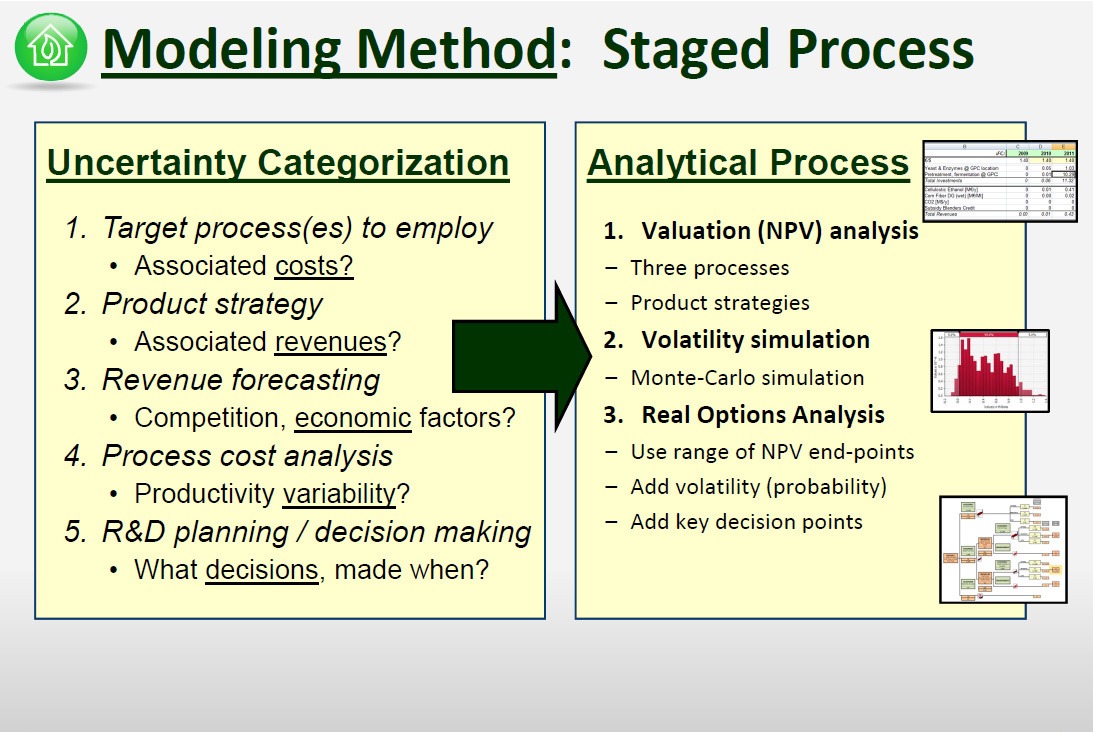
Scott Mongeau, founder and consultant at Sark7, explains: “Calculations of this nature are highly complex because so many factors need to be taken into account, which requires input from a wide variety of expert sources. Palisade’s DecisionTools Suite enables all the uncertainties to be integrated into a holistic risk simulation, so the end result is a more accurate reflection of the ‘big picture’ than it is possible to achieve from a set of scatter-shot static spreadsheets, which amount to patchy, tenuous ‘best guesses’.”
@RISK Determines Feasibility
Sark7 uses many inputs for the @RISK model to determine the NPV of a biofuel plant project. These include: the capital costs of building the biofuel plant; the most efficient configuration for annual yield; the (variable) price of feedstock (the raw material used to make biofuel) based on historical commodity price analysis, and the energy, yeast, enzyme and processing costs used to generate the biofuel; research and development costs; different oil and ethanol price scenarios to determine potential turnover; and competition simulation to determine the range of prices that can be charged for the end-product. In addition, the costs of financing the overall project (such as the interest payable on a bank loan and optimal capital, depreciation and tax scenarios) are incorporated into the model.
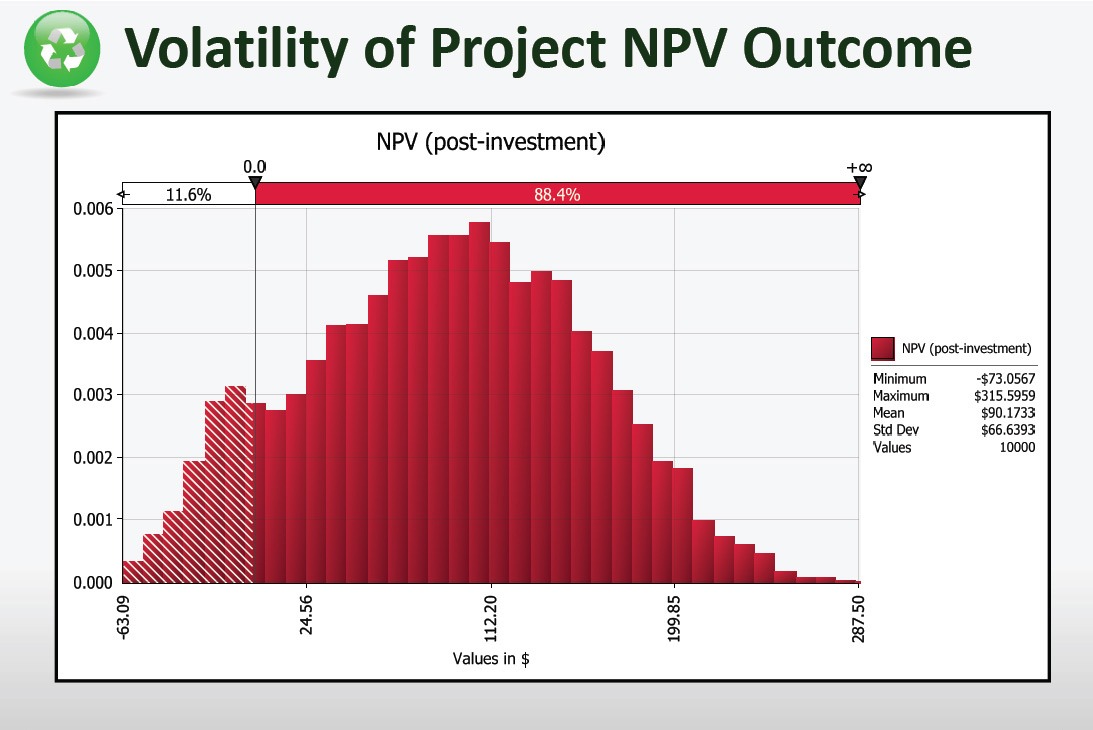
@RISK enables probability distributions for each of the major inputs, in order that the variables of each can be measured and analysed. The model results in aggregate probabilities and sensitivities showing which factors have the most influence on whether a project will be successful (ie profitable). Overall, the @RISK model demonstrates that, given proper integrated engineering, financing, and risk hedging (via option and future derivatives), a biofuel plant can be managed in a profitable fashion – profitability being at risk where the margin between feedstock and ethanol prices narrows significantly.
@RISK Balances Profit and Risk
Modelling in this holistic fashion with @RISK enables biofuel projects to address a fundamental principle of finance. Rather than looking at potential profit in isolation, it is important to balance the highest profit that can be gained for the lowest aggregate risk exposure across integrated implementation, technical, economic and financial aspects. It also ensures that sustainability experts factor in ‘real world’ issues such as the costs of commodities, which can be volatile because they are linked to global systems and events and therefore, where possible, should be hedged via financial instruments such as futures and options to reduce risk.
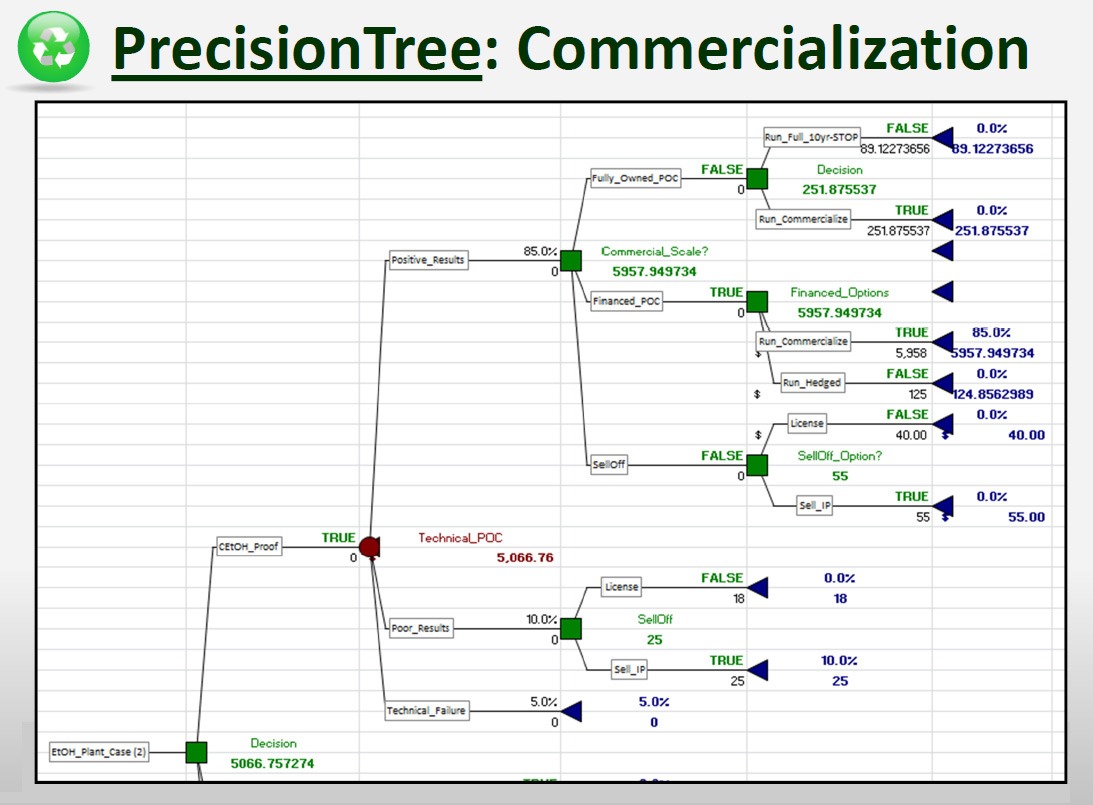
PrecisionTree Analysis Options
Throughout the whole project, PrecisionTree guides the decision-making process by enabling different scenarios to be analysed depending on the particular combination of integrated roll-out factors considered. For example, the option of whether to build a large scale biofuel plant can be weighed up against developing a smaller plant by comparing central risk / reward factors such as the investment required and the chance of technical success. Equally, options such as technology licensing and capital market financing can be integrated into decision tree models as alternative profit scenarios for like-to-like, risk-balanced assessment. At major stages, project abandonment via sale of the plant can be considered as flexibility of this nature adds potential value as a formal risk management contingency.
Evolver Solves the Optimisation Issue
At the crux of this type of integrated analysis is an understanding that implementation, technical, economic and financial decisions all overlap in terms of creating a unique risk / reward profile for a roll-out scenario. Changing the plant configuration adds to capital and financing costs, but creates the potential for high yields, though balanced by technical risk. Evolver provides the ability to run this as a complex, multivariate optimisation issue, in which a balanced set of factors and assumptions result in the highest potential reward for the lowest possible aggregate risk. Therefore it identifies the most cost effective, efficient, advanced plant possible while controlling financing costs and economic risk exposures. Evolver runs through random configurations, quickly developing candidates for ideal configuration and narrowing-in steadily on the optimal set of integrated design and implementation factors.
Commercial Potential
Investors in a profitable biofuel plant will also want to know that it is feasible to roll it out on a larger, commercial scale with additional plants in new territories, including the potential for licensing-out similar implementations. Analysis of the risks and return on investment outlined above provide some data as to whether this is financially viable. This is supplemented with further inputs to the @RISK model that reflect regional variables such as competition, agricultural supply, tax rates, labour and transport costs and local biofuel prices.
The DecisionTools Suite Enables a Focus on Finance
Using The DecisionTree Suite enables an in-depth level of detailed financial analysis suitable for presentation to potential capital investors who have sophisticated information needs. It provides them with the essential information that they require to understand whether a project is of interest to them given a specific risk threshold and expectation of returns. For example, in addition to the cost of building the plant, they can see the technical and economic risks involved (and the likelihood that they will happen, along with the consequences if they do) and therefore the risk-balanced return on investment they are likely to see.
“Proposals of this nature need to focus on the financial elements of a project, which is the information that investors want at their fingertips when considering whether to back any initiative, regardless of whether it is ‘green’,” explains Mongeau. “Environmental experts and enthusiasts need to be realistic about whether their proposal is financially viable if they are going to attract the funds that will make it a reality. Palisade’s risk analysis tools provide them with the language that is familiar to the financial world, as a result of which the project is more likely to receive funding. Sustainability criteria can therefore be met at the same time as providing investors with a risk-balanced return - so everyone wins.”
Technology that Streamlines Human Input
Using the DecisionTools Suite therefore enables the business case for a biofuel plant to be presented to potential investors, who can see immediately whether it meets their funding criteria. This includes having a clear understanding of the risks involved in the programme, and the knock-on effect this could have on their finances. The example uses a biofuel plant, but the principles are equally applicable to sustainable energy initiatives such as wind or solar energy.
“Palisade’s risk analysis software is simply ‘the best thing since sliced bread’, especially in our increasingly complex, uncertain global world. Because it runs in Excel, it is accessible to everyone and doesn’t become the exclusive domain of technical experts. Despite being highly sophisticated technology, it actually streamlines human conversations because it allows for integrated, like-to-like analysis of risks from the standpoint of highly specialised but distributed experts. Integrated simulation allows for the assessments of lawyers, economists, engineers, managers, and financiers to come together so that the proportional risks in mega-projects, large implementations and new technologies are clear to all” concludes Mongeau.
